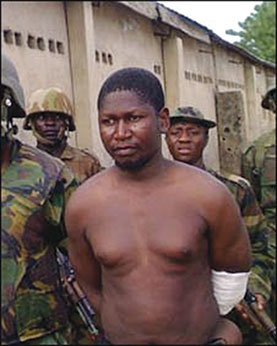Africa
Arrest of Muslim Muhammad Yusuf, Son of Boko Haram Founder, Signals Major Breakthrough in Nigeria’s Fight Against Terrorism -By Abdullahi Abubakar Ladan
As Nigeria grapples with multifaceted security challenges, Muslim Muhammad Yusuf’s arrest is undeniably a significant victory. Yet, it also serves as a reminder of the complex and evolving nature of terrorism in the region. For many Nigerians, the hope is that this breakthrough will mark the beginning of a broader, more coordinated effort to address not only terrorism but also the banditry and socioeconomic issues fueling instability.

In a stunning development in the ongoing battle against terrorism in Northeast Nigeria, seasoned journalist and security analyst Audu Bulama Bukarti has confirmed that Muslim Muhammad Yusuf, recently arrested in Chad, is the biological son of Boko Haram’s founder, Muhammad Yusuf. The revelation, shared via a detailed post on Bukarti’s verified Facebook profile on August 25, 2025, after 1 PM, underscores a significant milestone in the region’s counterterrorism efforts while sparking diverse opinions on its implications for Nigeria’s security landscape.
Bukarti, a respected Nigerian journalist with years of experience tracking Boko Haram and related insurgencies, conducted an independent investigation to verify Muslim’s identity. In his post, he revealed that Muslim, who was leading an Islamic State West Africa Province (ISWAP) cell at the time of his capture, was apprehended alongside five others by Chadian authorities. Initial suspicions arose due to Muslim’s striking resemblance to his late father, Muhammad Yusuf, the infamous Boko Haram leader killed in 2009. However, Bukarti sought concrete evidence, consulting individuals close to the Yusuf family from the pre-insurgency era.
Quoting a close family friend, Bukarti noted, “Yes, he is his son. He was two or three when they launched their insurgency. He is the son of Bintu, Muhammad Yusuf’s first and eldest wife.” This testimony was corroborated by Muslim’s uncles, who confirmed his lineage. The timeline further solidified the case: Boko Haram’s insurgency began in July 2009, meaning a child aged two or three at the time would now be 18 or 19 consistent with the age reported by Chadian authorities and Muslim’s appearance.
The arrest, reportedly facilitated by a Nigerian intelligence tip-off, marks a significant coup for regional security forces. It coincides with Nigeria’s recent announcement of the capture of two top leaders of Ansaru, a Boko Haram offshoot linked to al-Qaeda, and the head of the Mahmuda Group, a terrorist faction wreaking havoc in North Central Nigeria. Bukarti hailed the operation as a “turning point,” noting that capturing the head of a major terrorist faction alive is unprecedented and a testament to the effectiveness of Nigerian intelligence.
However, opinions on the arrest’s broader implications vary widely. Security experts argue that Muslim’s capture could yield critical intelligence, potentially disrupting ISWAP’s operations and weakening its leadership structure. “Taking a figure like Muslim alive is a game-changer,” said Dr. Amina Suleiman, a conflict analyst based in Abuja. “His knowledge of ISWAP’s inner workings could help dismantle their networks, provided authorities handle his interrogation strategically.”
Others, however, caution against over-optimism. Malam Ibrahim Gambo, a community leader in Maiduguri, expressed skepticism about the arrest’s long-term impact. “Boko Haram and ISWAP have shown resilience despite losing key figures in the past,” he said. “Unless the root causes—poverty, unemployment, and lack of education—are addressed, new leaders will always emerge.” Gambo’s view reflects a broader sentiment among some Nigerians who believe that military victories, while necessary, must be complemented by socioeconomic interventions to achieve lasting peace.
Bukarti himself emphasized the need for sustained action, urging authorities to redirect their focus to the bandit warlords plaguing Nigeria’s North West and North Central regions. “The same energy must now be turned on the bandit warlords ravaging the North West and North Central,” he wrote. “They, not Boko Haram, are today’s biggest threat to lives and livelihoods.” He argued that neutralizing these leaders, through arrest or elimination, would cripple their networks, bolster public confidence in the Tinubu administration, and demonstrate the state’s commitment to protecting its citizens.
Public reactions on social media and in local communities are equally diverse. On X, some users praised the Tinubu administration and Nigerian intelligence for their recent successes, with one post reading, “Kudos to our security forces! This is proof that Nigeria can defeat terrorism if we stay focused.” Others, however, expressed frustration over the government’s perceived inaction against banditry. “What about the bandits kidnapping our people daily in Zamfara and Katsina?” asked a user from Sokoto. “Boko Haram is not our only problem.”
As Nigeria grapples with multifaceted security challenges, Muslim Muhammad Yusuf’s arrest is undeniably a significant victory. Yet, it also serves as a reminder of the complex and evolving nature of terrorism in the region. For many Nigerians, the hope is that this breakthrough will mark the beginning of a broader, more coordinated effort to address not only terrorism but also the banditry and socioeconomic issues fueling instability.
The Tinubu administration now faces a critical test: sustaining this momentum and translating military successes into tangible improvements in security and governance. As Bukarti aptly noted, there is no room for complacency. The fight is far from over, but this arrest offers a glimmer of hope that Nigeria’s security forces are rising to the challenge.
























